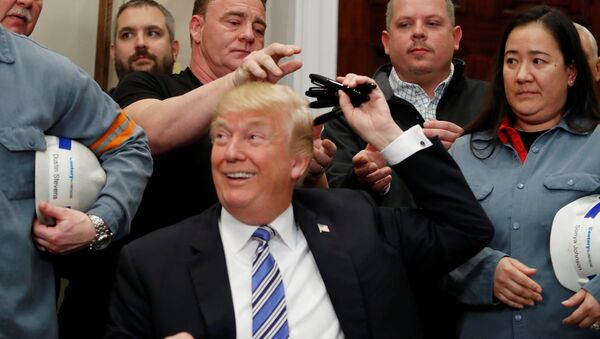Sputnik discussed this issue with Binoy Kampmark, geopolitical analyst, the lecturer at RMIT University.
Sputnik: Were you surprised by Donald Trump's decision to impose tariffs?
Binoy Kampmark: No, I wasn't particularly surprised, for the simple reason that he has promised and certainly promised in the electoral campaign, which he of course was running and when he won the race for the White House, a more protectionist approach, he was always, for example, emphasizing China, particularly China — the big bogeyman, and he occasionally mentioned, of course, the EU, and kept talking about the US trade deficit and kept talking about the fact the United States needed to refer to this, to neutralize this, to try to overcome it, of course, he kept using the term such as unfair and the fact that this burden had to be rectified I suppose, so it was bound to come the question was simply when.
READ MORE: Trump's Greatest Enemy is the Financial 'Vampire Squid'
Sputnik: Mr. Trump said the United States is "on the losing side of almost all trade deals, our friends and enemies have taken advantage of the United States for many years," he said, how much truth is there in this claim?
Binoy Kampmark: Well, the claim has to be seen, of course, like many things Mr. Trump says in the context of several factors, and one of the factors, of course, has to be the value that is placed on what he calls the deficits and so forth in terms of goods and services and so on. For example, last year the United States posted a $375 billion deficit with China but the Chinese response conveyed through the Commerce Minister Zhong Shan is that the nature of the trade deficit is being overvalued in terms of overstating and so on. The reality is that you have to consider the sorts of goods being traded, the way they are actually being valued and so on, it's true that there are certain deficits with other trading blocs, with the EU as well, this is something of particular concern, the issue is also manifested in terms of the relationship, say with Mexico and so on, but I think it is artificial in a sense in terms of how to relate these trade deficits. It's beneficial to treat them in simple accounting terms, he's using public accounting terms, using political terms to explain the disproportion between the US deficit and surpluses with other trading blocs and countries.
For more information listen to this edition of Weekend Special with Binoy Kampmark.
The views and opinions expressed by Binoy Kampmark are those of the speaker and do not necessarily reflect those of Sputnik.

